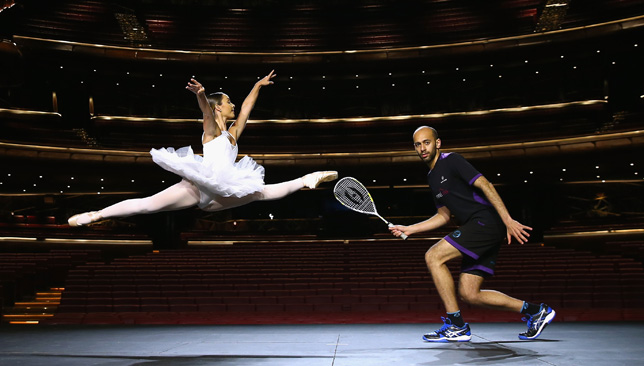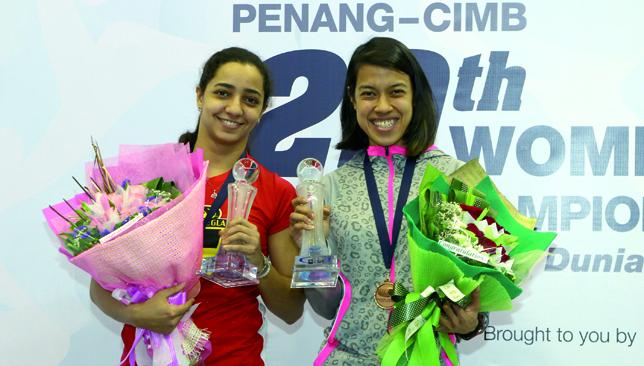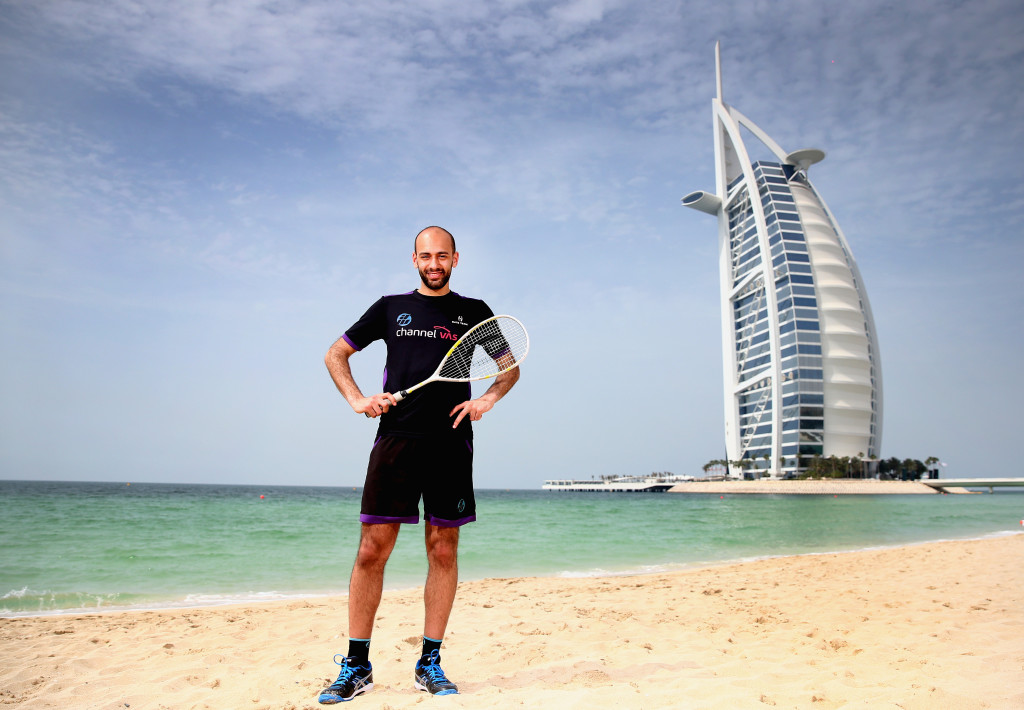
When world No5 Marwan Elshorbagy defeated his older brother Mohamed for the first time on the professional squash tour in the quarter-finals of the Windy City Open seven weeks ago, he couldn’t look him in the eye.
Donning a shirt that has ‘Elshorbagy Jr’ printed across the back, Marwan tossed his racquet in a conflicted moment that spanned the entire emotional spectrum. He looked both angry and relieved. Proud yet also ashamed. He buried his face in his brother’s neck and wept uncontrollably.
Mohamed, who lost his world No1 spot a few weeks after suffering that defeat, kept talking into Marwan’s ear, but the younger Elshorbagy seemed inconsolable.
“When I play Mohamed, some people think it’s harder for him than it is for me because he’s the older brother and all the pressure is on him, but it’s actually the other way around,” Marwan told Sport360 ahead of his maiden appearance at the PSA Dubai World Series Finals in Dubai Opera in June.
“Mohamed goes into it expecting to defeat me, the people are expecting him to defeat me, so when he does, he’s not thinking I’m defeating my younger brother, it’s the norm, it’s what should happen.

INTERVIEW: Raneem El Welily – Fighting hard to preserve her status as squash’s best
“But for me, I think about it completely differently. He has helped me so much, he has advised me, he has done everything for me, and after all that, I go and beat him? He made me and then I beat him?
“Especially that match in Chicago, it had completely different implications because that loss took him from the world No1 to the world No3. When he was greeting me after the match, he joked and said ‘after all this time, you’re the one who actually cost me my No1 ranking?’
Lovely touch between the two brothers @maelshorbagy & @moelshorbagy at the end of their match 👏 pic.twitter.com/JtIXdMceEz
— PSA World Tour (@PSAWorldTour) February 27, 2017
“He was joking. He was very happy for me but I was crying and I felt very sorry. I didn’t know what to say. The only time it hit me is when I threw my racquet and went to him and I realised I couldn’t look him in the eye. I couldn’t face him after beating him and because I never looked at his face, I only found out how proud of me he was when I saw the video of that moment later in my room. He was actually really happy and proud of me.
“He always said that ‘the day my brother beats me will be the proudest day of my life’ and he really means it. He wasn’t faking it.”
For so long Marwan lived in the shadow of his older sibling, who didn’t just spend 28 months at the top of the world rankings, but is also a two-time British Open champion and a force to be reckoned with in the sport, ever since he broke out as a teen squash prodigy.
The Egyptian entered that clash in Chicago carrying a 0-7 record against Mohamed. But on that day, the tables had turned.
Since then Marwan reached his first World Series final, climbed to a career-high ranking of No5, and defeated his brother one more time in El Gouna last week. Elshorbagy Jr. is rising while Sr. is moving in the opposite direction – down to No3 in the world and suffering unexpected losses.
The pair live together in Bristol, share the same team, and have an unbelievably close relationship. Going through contrasting periods in their career at the same time must produce feelings that are hard to digest.
Marwan takes us back to that day in Chicago and adds: “When we went back to the room after the match Mohamed hugged me and told me ‘I’m really happy for you’. He’s telling me that and it is actually the toughest period of his life. Can you imagine how special that is? It’s not easy at all for him.

“He’s been having a down season, he’s still No3 but it’s not what people expected from him and not what he expected for himself. Yet he can still find it in himself to be happy for me. He is able to keep our relationship above our sport, no matter how hard it is. He is happier for me than he is upset for himself.
“It’s very difficult and nobody can understand it except me and him. On each one of us it’s difficult in a different way. But it’s great that we showed the world how important a brotherly relationship really is, that this is how it should be.”
No matter how closely you watch sibling champions like Venus and Serena Williams, or Mohamed and Marwan Elshorbagy, it is impossible for one to comprehend how they feel when they square off in a competition.
Marwan describes it as an “awkward situation” for everyone involved, especially their mother, who is a key figure in their careers, and can often be seen giving them instructions court-side during their matches. But never when they’re facing each other.
“We made a deal since we were kids, that if we ever played each other, we’d never have anyone in our corners. We wouldn’t have coaches, we wouldn’t get advice from anyone,” said the Alexandrian.
“My mother doesn’t come to our matches if we are playing each other. She doesn’t speak to either one of us the day of the match. I think it’s tougher for her than for me.
“She doesn’t know what to say after the match. She can’t say congratulations to the winner and at the same time she can’t console the loser. She can’t advise us on what we did right or wrong in the match, because that can affect our next match against one another. So it’s hard for her. It’s very awkward the whole situation, for all of us.”
News: The line-ups have been confirmed for the season-ending PSA Dubai World Series Finals!https://t.co/LE5HmF66zA #Road2Dubai pic.twitter.com/h7vAELk1Xm
— PSA World Tour (@PSAWorldTour) April 18, 2017
Add to that the fact that Marwan and Mohamed share the same room during tournaments and the dynamic on match days in which they face off gets even more complicated.
But Marwan is used to complicated. He grew up looking up to Mohamed, who is three years his senior, but also with the weight of expectation on his shoulders, constantly fielding comparisons to his prolific brother. Such comparisons are no longer holding him back though and he says a change in his own mentality is why he is now a top-five player.
“I want to do more, I want to achieve more. You want to prove people wrong more. That’s always been a motivation for me, trying to achieve a lot in a short period – trying to prove people wrong. I feel like I’m a bit underrated as a player,” he admits.
“It comes down to my brother. What I’m going through, nobody will ever understand it. People have always compared me to my brother. Mohamed as a junior and as an up-and-coming player, he’s always been very successful. He made the top-10 when he was 20 or 19. He reached the quarter-finals of the World Championship when he was 17. So he achieved so much when he was young and that is something very special and very unique. Maybe only him and Ramy Ashour have done so much that young.
“So people comparing me to something like that all my life… it took me a while to realise that I have to be myself and that as a player I’m doing very well for my age.
“So I started to relax more when I got older. I turned it from a negative to a positive.”
Beyond the influence of his brother, Marwan credits his parents for everything he and Mohamed have managed to achieve. It must take an incredibly special family to produce one world-class champion, let alone two, and the Shorbagys have shown they are certainly no ordinary clan.
“My parents are very special,” says Marwan. “They made sure I had the same life as my brother, so that I would never go to them one day and say ‘you gave my brother more than you did me’.

“My mother travelled with us to Bristol and was living away from my father to make sure we didn’t suffer from a culture shock when we first went abroad. They sacrificed so much for us.
“My mother always wanted more from us and that was always the key. Even when we’d win a title, she’d be happy but she’d immediately tell us to work on something to do better.”
That constant strive to improve has now taken Marwan to his first showing at the elite season finale in the UAE in June, where the top-eight of the circuit will compete on a glass court at the Dubai Opera.
It’s the first time Marwan has qualified for the event and he commemorated the feat by taking part in a stunning photoshoot across five of the emirate’s most beautiful locations.
“When I got the call (about the shoot) I didn’t think about it twice,” said the 23-year-old.
“Mohamed did it last year and told me how amazing it was. I had never been to Dubai before so I was quite keen. It was amazing because the way they created the video, the story of it was incredible. It was like a sight-seeing trip for me, I visited five different places on my first day in the city. It was a different kind of experience for me, acting in front of the camera. I can’t wait to come back in June.”
*You can watch Marwan and the world’s top squash female and male players in Dubai from June 6-10 by purchasing tickets from www.dubaiopera.com or from the Dubai Opera Box Office.